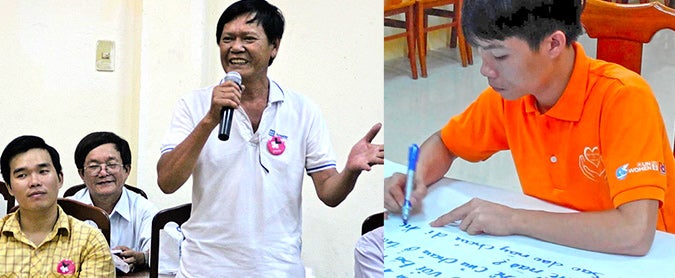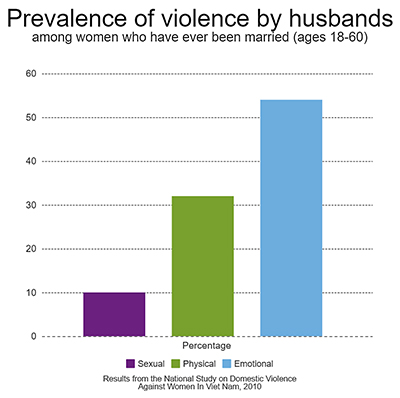Engaging male advocates to prevent violence against women and girls
Date:
26-year old Tran Van Chuong frequently awoke to the telltale sounds of his neighbor’s wife being beaten by her husband. Their arguments would start quietly but escalate quickly as his neighbor turned to physical brutality, leaving his wife sprained and scraped. This was not an uncommon problem in their urban community in Da Nang, a major central Viet Nam port city of one million people.

In Viet Nam, violence is accepted as a disciplinary tool for men to establish their authority over the women in their lives – as long as it occurs in the privacy of the home, according to qualitative research supported by United Nations Population Fund, UNFPA and Partners for Prevention Joint Programme.
In fact, more than half of women in Viet Nam report experiencing violence at some point in their lifetime, according to the Government and the United Nations’ National Study on Domestic Violence Against Women in Viet Nam. This violence is shown to have serious physical and mental health consequences, with abused women up to three times more likely to contemplate suicide.

Mr. Chuong was concerned about his neighbor’s violence but also conflicted. He wished he could help but feared it was inappropriate to interject himself into a private family matter. Mr. Chuong is a younger man living in a community where respecting the hierarchy of age is core to respecting societal norms. It is considered disrespectful for a younger man to speak out and stand up to an older man.
But Mr. Chuong found a way to help his neighbours. He is a voluntary member of the Male Advocacy Club – part of a one-year Male Advocacy Programme being implemented by the Da Nang Women’s Union in partnership with UN Women, UN Volunteers, and the Partners for Prevention Joint Programme. The programme supports one of the UN’s Sustainable Development Goals for the year 2030—gender equality—a key component of which is the elimination of violence against women and girls. Six months into the programme, initial reports show promise of changing gender norms and prevention of violence.
Mr. Chuong raised his concerns with his fellow Male Advocacy Club members. “I learned that I have a responsibility to help build a peaceful community intolerant of violence against women and girls, and the process starts with educating those around me,” he says.
Mr. Chuong provided temporary refuge for his neighbor’s wife while she got support from local police and a community based counseling team. Meanwhile, men from the counseling team, some of whom are also older club members, approached Mr. Chuong’s abusive neighbor. They discussed attitudes regarding gender equality, healthy relationship skills, the perils of using violence against his wife, and legal repercussions. As a result, Mr. Chuong reports a somewhat improved relationship between his neighbors, who live together again.
Generations working together
Using the combined power of different generations to prevent violence against women and girls, the Male Advocacy Programme invites younger and older men who show an interest in violence prevention to join a nearby club. Together, 120 men aged 18-60 in Da Nang Province work to transform deep-rooted community values accepting gender inequitable attitudes and harmful masculinities – beliefs and behaviors that increase women and girls’ risk of violence.
Both younger and older men benefit from the clubs in unique ways, as do their communities. The younger participants are equipped with gender equitable attitudes and relationship skills, establishing new norms, and ultimately helping prevent violence against women and girls for future generations.
“I used to be hot-tempered,” Mr. Chuong confesses, “but now I’ve changed completely. The club taught me effective communication skills, how to exercise restraint, and how to convey my feelings without insulting or hurting those I’m speaking to.”
Simultaneously, the programme works to challenge harmful masculinities among older men so they can resolve conflicts in respectful ways yielding more harmonious family relationships and communities.
Community change starts with individuals
Hoang Van Duc is a 58-year-old social worker and a pillar of Da Nang’s violence prevention community. He leads a different Male Advocacy Club in a rural suburb of Da Nang. He too has learned to better respect his wife and two daughters through the club’s trainings.
“In order to be a pioneer in the prevention of violence against women and girls, I needed to start by changing my own behaviors,” Mr. Duc admits. “I used to get feisty with my wife and daughters when they acted against my will. The Male Advocacy Club taught me to curb my anger and listen more. And my wife trusts me more now that we share family and business related decisions and responsibilities, which I learned, takes the pressure off of me too.”
Mr. Duc’s introspective approach underscores the intervention’s framework: Creating a safe and equitable community starts at the individual level and gradually expands from there.
One way Mr. Duc supports his community is by providing conflict resolution advice. For instance, his younger neighbors suffered a volatile marriage – their arguments frequently carried into nearby homes. Through Mr. Duc’s counsel, their relationship has significantly improved.
“Without Mr. Duc’s advice, I wouldn’t have known that scolding my wife and leaving her out of key decisions hurt and disrespected her,” Mr. Duc’s neighbor says. “My wife’s sadness permeated through our lives, negatively impacting our family’s happiness, my children’s education and our neighbors.”
The programme’s goal is to eventually empower club members to serve as volunteers in their communities, engaging in and leading violence prevention activism.
Sustaining the promise of a future free of violence against women and girls
By empowering men to initiate their own efforts to prevent violence against women and girls within their communities, the Male Advocacy Programme’s impact looks promising.
“The most difficult barrier to ending such violence is the reign of gender biases deep within the community – not only with male perpetrators, but also with female victims of violence,” Mr. Chuong explains. “Comprehensive change requires time and the full participation and support of many men – those who are young like me and elders too. I will continue my work after the programme ends because I want to contribute to a safe and equal community for all to enjoy.”
Mr. Duc is also committed to carrying on the Male Advocacy Club’s legacy, and he is optimistic that societal change is on its way. “While gender stereotypes are still entrenched in the community, I have hope the trend is reversing,” Mr. Duc says. “I will always continue spreading gender equitable attitudes and behaviors so one day we live in a community – and country – free of violence against women and girls.”